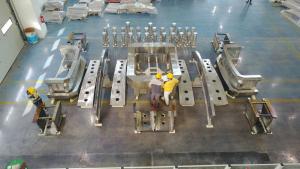In Europe, which is producing five of the nine vacuum vessel sectors, a consortium of industrial firms has divided out the tasks of manufacturing the many sub-elements of each sector, step-by-step assembly activities, and demanding welding and non-destructive examination stages.
With contractors and subcontractors located across Europe, the European vacuum vessel fabrication consortium (see more
here) has sought to increase its manufacturing capacity. In a recent
article on vacuum vessel manufacturing progress, the European Domestic Agency reports that all five sectors are now in some stage of fabrication, with
sector #5—the first due on site according to the ITER machine assembly schedule—leading the pack.
European companies CNIM (France), ENSA (Spain), MAN (Germany), ProBeam (Germany), Belleli (Italy), Mangiarotti (Italy), Walter Tosto (Italy), and Ansaldo Nucleare (Italy) are all involved.
Vacuum vessel manufacturing is time-consuming and labour intensive due to the sheer volume of sub-elements, their unconventional shapes, and their size. At the end of the process, each sector will measure 6.5 metres high, 3 x 6 metres in width and depth, and weigh between 400 and 500 tonnes. Fabrication is a multiyear process that has involved multiple qualification phases before passing on to manufacturing design, material procurement, precise machining, and finally welding. Because the vacuum vessel and ports are classified as nuclear pressure equipment under French ESPN regulations, the welding and non-destructive examination activities are submitted to particularly stringent specifications.
For the European industries involved participation in such a high-profile and demanding manufacturing project has contributed to increasing their expertise and skill base, and improving their competitiveness on world markets. (
See related article in this issue.)
Read the full article on the European Domestic Agency website here.


